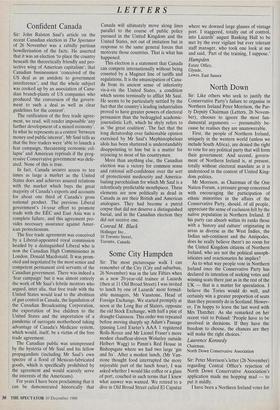LETTERS Confident Canada
Sir: John Ralston Saul's article on the recent Canadian election in The Spectator of 26 November was a rabidly partisan bowdlerisation of the facts. He asserted that it was an election `to place the country beneath the theoretically friendly and pro- tective wing of American capitalism'; that Canadian businessmen 'conceived of the US deal as an antidote to government interference'; and that the whole subject was cooked up by an association of Cana- dian branch-plants of US companies who produced `the conversion of the govern- ment to such a deal as well as clear guidelines for the content'.
The ratification of the free trade agree- ment, we read, will render impossible `any further development of a mixed economy'. In what he represents as a contest 'between money and public interest', Mr Saul tells us that the free traders were 'able to launch a fear campaign, threatening economic col- lapse' and American reprisals if the prog- ressive Conservative government was defe- ated. None of this is true.
In fact, Canada secures access to ten times as large a market as the United States does and achieves assured relations with the market which buys the great majority of Canada's exports and accounts for about one third of Canada's gross national product. The previous Liberal government's 14-year effort to promote trade with the EEC and East Asia was a complete failure, and this agreement pro- vides necessary assurance against Amer- ican protectionism.
The free trade agreement was conceived by a Liberal-appointed royal commission headed by a distinguished Liberal who is now the Canadian High Commissioner in London, Donald Macdonald. It was prom- oted and negotiated by the most senior and competent permanent civil servants of the Canadian government. There was indeed a 'fear campaign' but it was almost entirely the work of Mr Saul's febrile mentors who argued, inter alia, that free trade with the United States would lead to the abolition of gun control in Canada, the liquidation of the Canadian Broadcasting Corporation, the exportation of live children to the United States and the importation of a pandemic of surrogate motherhood taking advantage of Canada's Medicare system, which would, itself, be a victim of the free trade agreement.
The Canadian public was unimpressed by the hysteria of Mr Saul and his fellow propagandists (including Mr Saul's own spectre of a flood of Mexican-fabricated goods, which is specifically prohibited by the agreement and would scarcely serve the interests of the Americans).
For years I have been proclaiming that it can be demonstrated historically that Canada will ultimately move along lines parallel to the course of public policy pursued in the United Kingdom and the United States, not out of imitation but in response to the same general forces that motivate those countries. That is what has happened.
This election is a statement that Canada can compete internationally without being cosseted by a Maginot line of tariffs and regulations. It is the emancipation of Cana- da from its ancient sense of inferiority vis-à-vis the United States, a condition which seems terminally to afflict Mr Saul. He seems to be particularly nettled by the fact that the country's leading industrialists proved to have greater powers of electoral persuasion than the bedraggled academic- journalistic Left, which he shyly refers to as `the great coalition'. The fact that the long dictatorship over fashionable opinion exercised by Mr Saul's Mephistophelean idols has been shattered is understandably disappointing to him but is a matter for rejoicing to most of his countrymen.
More than anything else, the Canadian election was a victory for common sense and rational self-confidence over the sort of protectionist mediocrity and America- baiting parochialism for which Mr Saul is a relentlessly predictable mouthpiece. These elements are now politically as dead in Canada as are their British and American analogues. They had become a putrid corpse that did not deserve a distinguished burial, and in the Canadian election they did not receive one.
Conrad M. Black
Hollinger Inc., 10 Toronto Street, Toronto, Canada


























































 Previous page
Previous page